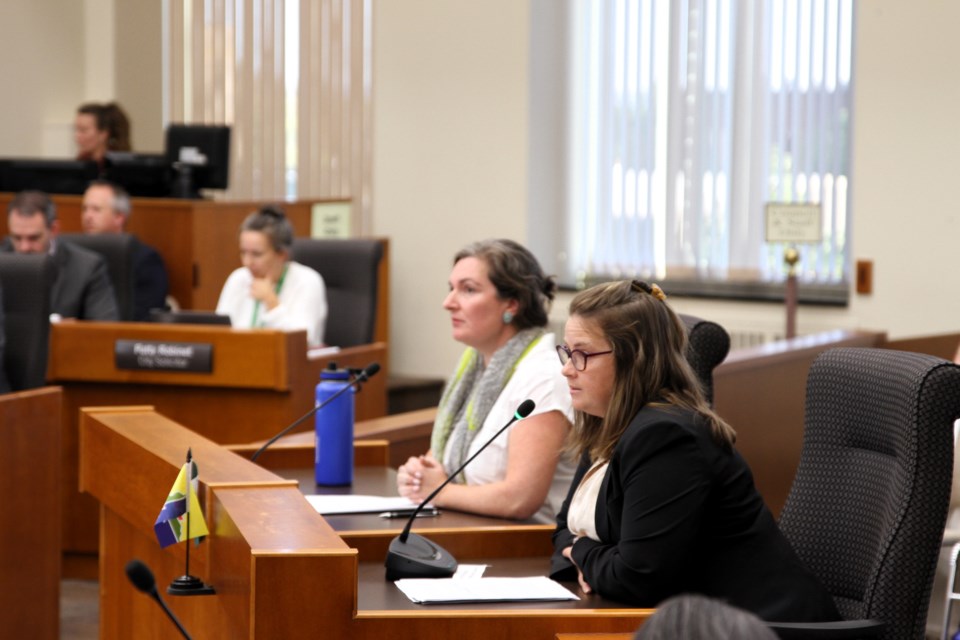THUNDER BAY – City council has decided to settle on learning more in regards to the transportation of hazardous goods on Ontario’s highways after a lengthy debate.
Administration recommended the city send a letter to the province to adopt the proximity principle, which keeps the storage of hazardous goods such as used nuclear fuel near the site where it’s produced, as city administration would then review the current standards concerning the transportation of hazardous goods within city boundaries.
Council voted in favour of reviewing Thunder Bay's dangerous goods route and determining if further changes are necessary to strengthen the city policy on the transportation of hazardous goods.
The second paragraph of the recommendation, which largely surrounds Thunder Bay taking a stance that urges the province to adopt the proximity principle, lost at a tie.
During the discussion, Coun. Mark Bentz noted a decison previously made by council may have been a tad early.
“I think we acted a little prematurely last week. We heard only one side of the story. It’s not to say that those who voted or against did so in an uneducated manner because maybe they had other information,” Bentz said, before asking his fellow council members to consider all the information.
During a deputation by the Nuclear Waste Management Organization, Joanne Jacyk, site director for Ignace, and Caitlin Burley, director of strategic programs and transportation, said their presentation was meant to dispel misinformation presented to council last week by the activist group We The Nuclear Free North.
“There are two sides to the scientific evidence-based research. There are many, many lanes and each lane draws on a collective picture,” Jacyk said in her deputation.
Jacyk and Burley outlined the scope of the Deep Geological Repository (DGR) Project in its current state in the North, explaining the Revell Lake site west of Ignace is one of two potential sites where Canada’s spent nuclear fuel will be stored. The other location is on the Bruce Peninsula in southwestern Ontario. The Revell Lake site sits directly on the Wabigoon Lake First Nation’s traditional territory, therefore their willingness is necessary for site selection to commence by the end of the year.
Jackyk told Newswatch the Revell Lake area site is a point of interest because of the stable conditions Revell batholith.
“What we are looking for is a stable rock formation that we can at the depth that we need for a minimum depth of the repository of 500 metres. That it is going to be dry, it's gonna be old, it's gonna show a lot of stability over time and that's what the data is showing us,” Jackyk said.
On the transportation side, Burley pointed out that transportation of hazardous goods on Canadian highways is “highly regulated.”
NWMO need to get regulation approval from the Canadian Nuclear Safety Commission to begin construction of the DGR. Burley said the NWMO will not get the approval to ship used nuclear fuel bundles to the Revell Lake area site prior to the DGR is complete, a build that will take 20 years.
Once the DGR is complete, NWMO says 5.5 million bundles of used nuclear fuel will be stored in the repository over its lifespan.
A large part of the discussion centred around the current scope of hazardous material transported on Ontario highways today.
Burley was not able to say how much hazardous material is currently shipped through Thunder Bay, when asked by Coun. Rajni Agarawall.
“One of the reasons we don’t have those numbers is that the transport data is highly secure activity, which means there aren’t a lot of people that know about transportation shipments because it’s done on a need-to-know basis,” said Burley.
Burley said transportation routes and the timing of the shipments for hazardous materials “are considered prescribed information.”
“We cannot share them and that is for public security reasons and that's mandated by the federal government and the Canadian Nuclear Safety Commission,” said Burley.
The data can be provided to council, but that information would not be specific to the Thunder Bay area and cannot be shared with the public.
Regardless, hazardous material is shipped across Canada daily.
Coun. Andrew Foulds said Thunder Bay should have input surrounding the discussion of transporting nuclear waste through the area.
“We are one of the communities in the north that should have input…to say that we already have dangerous goods so we should accept more, that maybe an argument but it’s not one I adhere to,” said Foulds.
He added he doesn’t accept comments that Thunder Bay doesn’t have the mandate or the jurisdiction of Ontario’s Highways. However, he believes the city should accept both resolutions until more education and input can be gathered by the scientific community and NWMO.
Mayor Ken Boshcoff said he would vote on the positive side of the resolution, adding as a former MP, he understands safeguards are in place.
“I am convinced it’s as safe as any other options and we see accidents all the time. So, I am not saying because there are other accidents that there will be another. But, I, in fact, think the safeguards for this are far more severe and strict than almost any other form of possible transportation,” he said.
